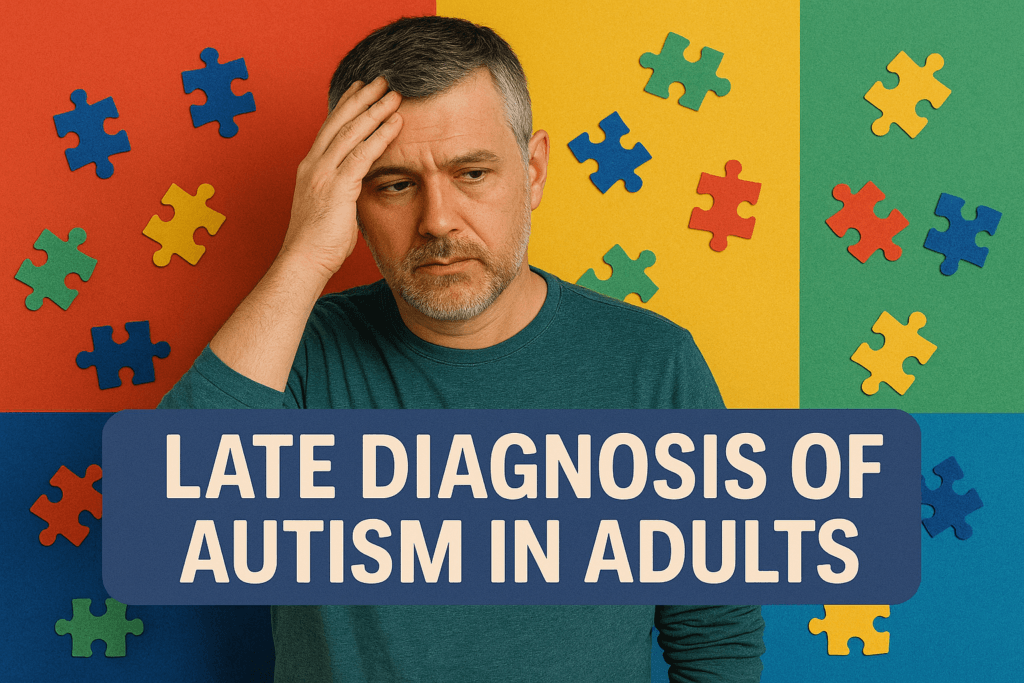🧩 Autism is a lifelong neurodevelopmental condition, yet many individuals don’t receive a diagnosis until well into adulthood. While autism is commonly associated with early childhood, growing awareness has brought attention to late-diagnosed adults who lived much of their lives without understanding why they felt different. In this in-depth article, we explore the reasons behind late diagnoses, the emotional impact of discovering one’s autistic identity later in life, and the resources available for those navigating their newfound path.
🌟 What Does Late Diagnosis Mean?
Late diagnosis refers to individuals who are identified as autistic during adulthood—often after years of social challenges, misdiagnoses, or being labeled as quirky or introverted. For many, this discovery provides a lens through which their lifelong experiences suddenly make sense.
🧠 Why Are Many Adults Diagnosed Late?
1. Misunderstanding of Autism Symptoms
Traditionally, autism was studied and diagnosed based on male-centric presentations. Many adults, especially women and those with milder traits, did not fit the expected pattern.
2. Masking and Camouflaging
Adults with autism often develop coping mechanisms like masking (mimicking neurotypical behavior) to fit in. This can delay diagnosis, as outward signs may be suppressed.
3. Limited Screening in Past Decades
Many of today’s adults were children in eras where autism was poorly understood. Diagnostic tools were limited, and teachers or parents were unaware of what to look for.
4. Misdiagnosis or Overlapping Conditions
Conditions such as ADHD, anxiety, depression, or OCD may overlap with or mask autistic traits, leading to misdiagnosis.
🔍 Signs That May Prompt a Late Diagnosis
- Difficulty in maintaining relationships
- Preference for routines and predictability
- Sensory sensitivities (e.g., to noise, texture)
- Trouble interpreting social cues
- A history of burnout or shutdowns after socializing
- Strong interest in specific topics (“special interests”)
If these traits resonate, it may be worth seeking evaluation from a specialist in adult autism.
🧾 How to Seek an Autism Diagnosis as an Adult
- Self-Assessment Tools: Online checklists like the AQ (Autism Quotient) can help identify traits.
- Finding a Specialist: Look for psychologists or neurodivergence-informed professionals who evaluate adults.
- Preparing for Assessment: Document your developmental history, struggles, and reasons for seeking evaluation.
- Formal Assessment: Involves interviews, questionnaires, and sometimes feedback from family.
💬 Emotional Impact of a Late Diagnosis
Receiving a diagnosis can trigger a whirlwind of emotions:
- 😢 Grief: Mourning the time spent misunderstood.
- 😮 Relief: Understanding the reasons behind life-long challenges.
- 😡 Anger: At missed opportunities or inadequate support.
- 😊 Empowerment: Gaining a new sense of identity and community.
🧘♀️ How to Navigate Life Post-Diagnosis
- Join Support Groups: Online forums or local meetups offer community and shared experiences.
- Therapy: A neurodiversity-affirming therapist can support processing your diagnosis.
- Education: Learning about autism helps develop self-compassion and self-advocacy skills.
- Accommodations: Understanding your needs helps seek workplace or daily life adjustments.
💡 Benefits of a Late Diagnosis
- Clearer self-understanding and improved mental health
- Better relationships through communication of needs
- Access to community, resources, and possibly disability support
- Validation of past struggles and achievements
📚 Recommended Resources
- “NeuroTribes” by Steve Silberman
- “Divergent Mind” by Jenara Nerenberg
- Reddit’s r/Autism and r/aspergirls communities
- Autism Spectrum Quotient (AQ) Test
❤️ Support Autism Wings Inc.
At Autism Wings Inc., we believe in creating holistic support systems for children with autism—including nutritional education, therapy, and soon, a dedicated school!
We’re currently raising funds to build a specialized Autism School that nurtures every aspect of development. Your contribution can change lives. 👉 Donate Now
Stay tuned for the next articles in this series:
- Comorbidities with Autism
- Girls and Autism
- Autism Research 2025
- Autism Stimming
- Neurodiversity and Autistic Pride
- Educational Approaches for Autism

